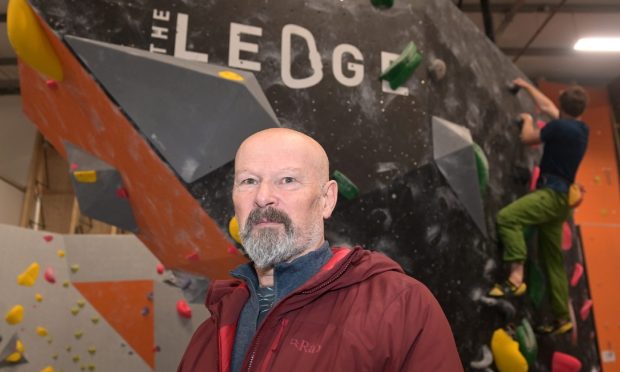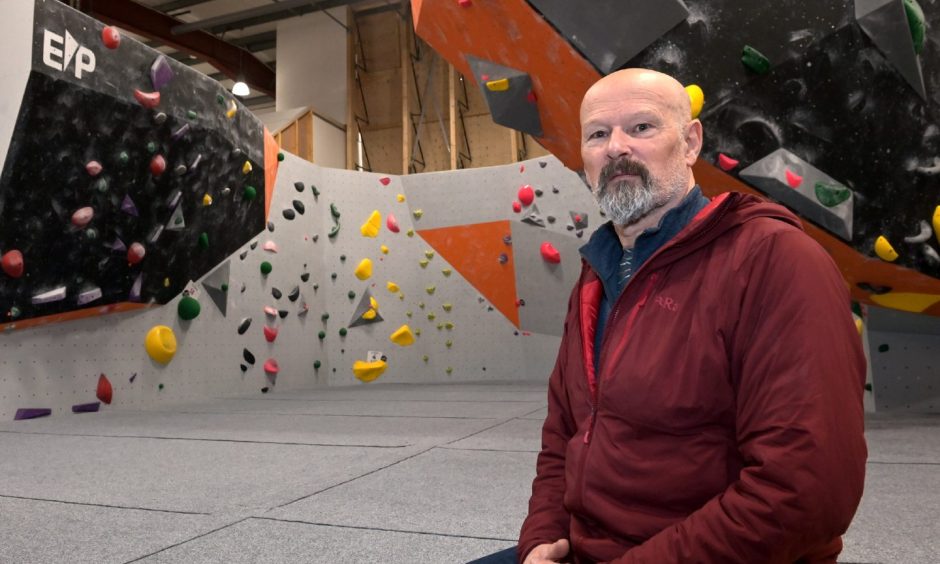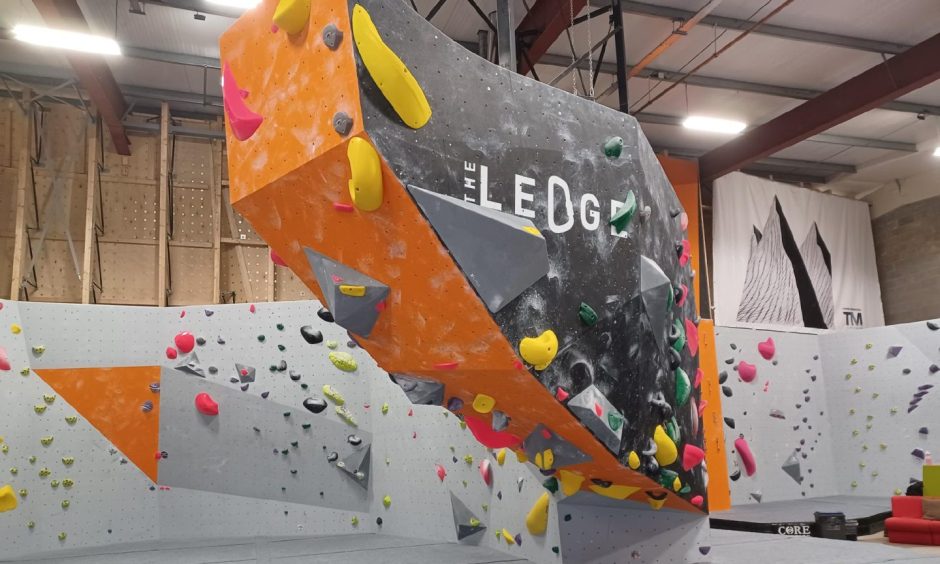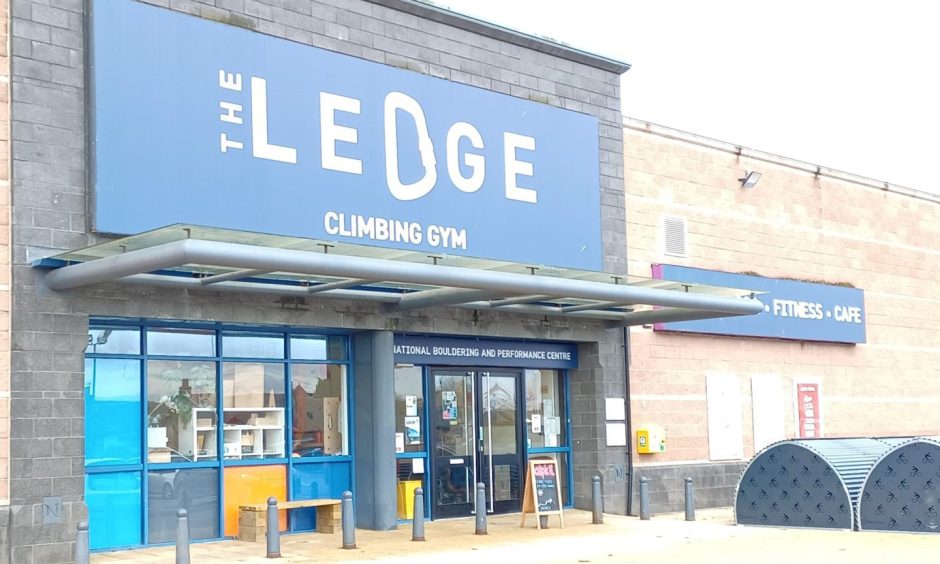The strength of climbing in a group is that you can get a leg up and also be saved from falling.
The philosophy applies to The Ledge which is making an impact since opening in Inverness less than two years ago.
Behind it all is Duncan McCallum, who followed an unconventional route into the job.
Now he’s here, he and his team have a very ambitious vision.
The Ledge is a facility for recreational and competitive climbers to test their skills on an Olympic-standard bouldering wall.
But he is also determined to use the sport to help people – be that finding work or dealing with cancer.
How many people use The Ledge?
This year The Ledge has seen 44,200 visits by climbers of all ages and abilities, including a growing number of tourists.
It recently hosted a Climb Scotland Scottish national bouldering league competition, attracting entrants from Shetland to Glasgow.
Income from monthly memberships, as well as a café and shop it rents out, help support grant-funded work for its diverse users.
“The strong thing about The Ledge is that the charity side is supported by a really good, strong climbing community who believe in what we are delivering”, says founding director Duncan McCallum.
Duncan grew up in Dingwall and started climbing aged 13.
In the late 1970s he gained a degree in photography and filmmaking in Edinburgh.
His climbing expertise helped get him work in challenging locations, including the nature documentary series The Trials of Life, presented by David Attenborough.
The Ledge is born
He later worked as a professional climber and ran a yoga and ski chalet in France.
In 1995, with a fellow climber and an architect, he bought a disused quarry and developed the Edinburgh International Climbing Arena which opened in 2003.
Returning to the Highlands, he set his mind to opening a climbing wall in Inverness.
The Ledge charity was formed in 2017 and a new climbing wall was initially planned for Inverness Marina.
After being delayed by Covid, the facility eventually opened in a former retail unit in Telford Street in April 2023.
“Having made a living from climbing, I wanted to give something back”, said Duncan.
“The charity was the best vehicle to develop something that would be climbing community-based and focused on trying to do good work in the area.”
As well as its core function, the centre holds special sessions for women and for the LGBTQ community.
It is also looking to start DJ nights for a group if young people who would not normally have access to climbing.
It works with schools, colleges and carers to help unemployed youngsters and on social impact programmes for 8-14 year-olds.
Helping those with cancer
Last year it delivered 1,600 hours of free or grant-subsidised courses for around 280 young people using climbing as a therapeutic tool.
With specially-trained instructors, it has held a trial to help people with cancer through exercise.
It is now taking part in a programme, Climbing Beyond Cancer, to help a rolling group of 12 adults as part of their cancer treatment.
Another project with the charity Young Lives Vs Cancer is helping youngsters aged eight and over undergoing treatment.
The Ledge is the only climbing wall in the UK involved in cancer programmes and one of only three in the world.
“It’s really interesting work and very rewarding”, says Duncan.
“There was tremendous interest when we ran the programme last year and we got great feedback.
“Exercise keeps people flexible and strong. It keeps their minds going and gives them a sense of community.”
He says employability skills taught at The Ledge, including working outdoors, are particularly needed in the Highlands.
That particularly applies to jobs being created in the renewables industry and the green freeport.
“They want people to work outdoors in a difficult environment.
“But they can’t find the young workforce that has the necessary outdoor component for a job in the Highlands.
“So we’re starting a project to develop that, to transfer the outdoor walking and climbing skills into an employment situation.”
Balancing the commercial and charitable work
Duncan says it costs nearly £1 million to keep someone on benefits for their working life.
Converting just two or three young people into useful employment could recover the entire capital cost of the climbing wall.
The trick is to balance the running of the facility with its wider work.
“We have to keep the doors open and the lights on, so having a vibrant, strong community is absolutely important to keep things running”, says Duncan.
“It feels warm and welcoming so that has been a huge success.”
And there are early signs the charitable side is having an impact.
One school reported there is 30-40% better pupil engagement on days they visit The Ledge.
“There is a very positive effect from the social impact work.
“The next step is to do more with the employability programmes and cancer care”, said Duncan.
The charitable work means The Ledge has more staff than other similar places.
““The cost model is therefore different to a normal commercial climbing wall.
“But we believe the benefits are huge.”
For more Inverness news and updates visit our dedicated page and join our local Facebook group.





Conversation